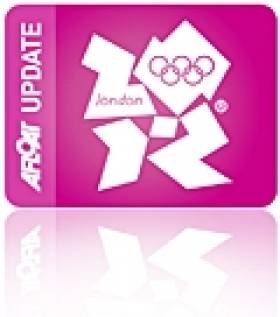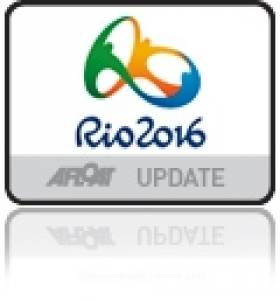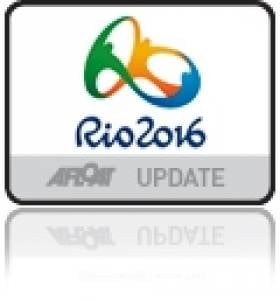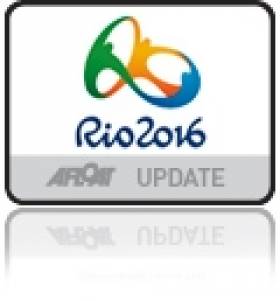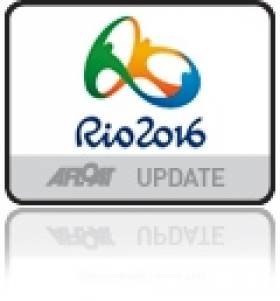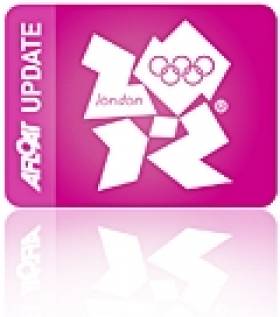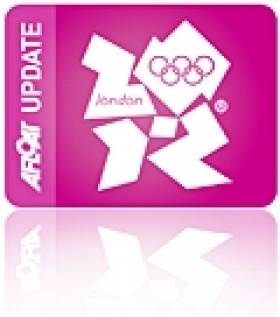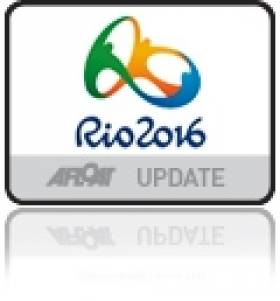Displaying items by tag: Olympic
UK Sailing Academy Inspires Dinghy Olympians of the Future
#olympic – In the afterglow of the 2012 London Olympics, the UK's Weymouth and Portland National Sailing Academy (WPNSA) is making the success of the Olympic legacy a personal goal, by helping to inspire the sportsmen and women of the future.
The Olympic sailing venue is making a conscious effort to ensure the Olympians of the future have the best facilities and training available to them. Having hosted youth sailing events and training for a number of years, the Academy have always had a passion for getting youngsters into the sport, but following on from the Olympics, this focus has shifted up a gear with a great emphasis now placed on encouraging children to take up the sport of sailing.
In association with the Chesil Trust charity, WPNSA have facilitated a 'Sail for a Fiver' scheme which enables schools in Dorset and the surrounding counties to bring classes of children to the venue for half day training courses, with the cost at just £5 per child, although the scheme costs more to deliver, the difference being funded by the Chesil Trust, with support form the Academy. So far over 10,000 children have got out on the water for the first time through this scheme, and the aim is to continue to give as many children as possible this opportunity.
There are a number of youth sailing classes who frequently utilise the facilities and idyllic sailing waters at WPNSA including the Optimist, Topper, Cadet, 29er, RS Tera and Laser Classes.
The Optimist Class, boasting the largest number of participants in any youth sailing dinghy in the UK have held numerous events and training at WPNSA including National Championships, Squad Selections and Training camps.
Simon Rogers, Chairman IOCA (UK) commented; "It is always guaranteed good racing when holding an event at WPNSA, the facilities more than cater for what can be 500+ Optimists and their parents. The Optimist Class has long been using WPNSA as a venue for events, but having watched the Olympic Games take place there is certainly an inspiring element to it. Youngsters as young as eight years old can be a part of an event at the same venue where Olympic Sailors are carrying out their training simultaneously. Next month we are holding the 2013 Optimist Selector Event, to determine who will represent Great Britain at the World and European Championships this year."
The Topper Class has recently held an all-girls training day from the Academy, something common within youth classes aiming to provide a fun and healthy learning environment for girls to develop their sailing skills whilst providing some active role models within the sport to encourage greater female participation.
Lord Sebastian Coe has high praises for the Academy:
"Weymouth and Portland National Sailing Academy successfully hosted the world's elite sailing and windsurfing athletes for the Olympic and Paralympic Games, one of the greatest shows on earth. The award winning venue has now entered its new phase in life as a multisport facility for everyone to enjoy. The Academy will continue to inspire new generations of water enthusiasts both locally and globally. Offering facilities for beginners' right through to high profile competitors, the sporting venue caters to both abled and disabled competitors. With a strong commitment to sustainable practices the WPNSA is ensuring that a natural environment is maintained as the ultimate water sports venue."
Upcoming youth events at WPNSA include Squad Training for the Topper and RS Tera Class, the 2013 Optimist Selector event, and the RS Tera National Championships. The sportsmen and women of the future are being greatly inspired by the lasting 2012 Olympic legacy; with the Academy making a heartfelt effort to keep the momentum and celebration of sport in Great Britain alive.
-
Annalise is Laser Sharp for ISAF World Cup in Palma
#olympic – Annalise Murphy will be saying goodbye to her recently purchased Moth dinghy and hello to her Laser Radial next week for the ISAF Sailing World Cup in Palma commencing on 1 April with an exciting array of world class competitors ready to embark on new challenges.
Held across Club Nàutic S'Arenal and Club Marítimo San Antonio de la Playa over 900 sailors will fight for the titles in the ten Olympic events.
Thirty seven of the 38-boat Nacra 17 fleet will take to ISAF Sailing World Cup race action in Palma for the first time. ISAF Sailing World Cup Miami victors Sarah Newberry and John Casey (USA) are the only team racing from the inaugural appearance of the multihull in January.
From skiff sailors to former windsurfers the fleet welcomes a blend of sailing talent who are looking to apply their skills and mind set to the Olympic multihull.
Making the switch from the Laser Radial to the Nacra 17 is two time Olympian Nathalie Brugger (SUI) who is teaming up with former Men's 470 sailor Matias Buhler. "After six years in the Radial it is quite demanding on the body and I was looking forward to a change and a new challenge," said Brugger.
"I am lucky to get to team up with Matias – we have known each other for quite a while and he has a lot of racing experience from the 470 and other big boat programs. I guess we both knew that if either of us was to campaign in the Nacra 17 for Switzerland, together we would be the best team."
Despite years in the Radial Brugger is no stranger to multihull racing after she sailed on Dona Bertarelli's boat, the Decision 35 Ladycat, in the M32 Cup on Lake Geneva, Switzerland. Even though Brugger has sailed with some skilled multihull sailors she isn't expecting miracles overnight at ISAF Sailing World Cup Palma, "I think all the teams will be watching Sarah and John as well as the Dutch teams as they have maybe had the most time and experience with the boats. It will be about learning to get the best speed and boat handling but this early in the Olympic cycle the focus for Matti and I will be about building our own team."
Three Dutch teams will be sailing in Palma, Mandy Mulder and Thijs Visser, Renee Groeneveld and Karel Begemann and Elke Delnooz and Mischa Heemskerk. Mulder and Groeneveld come from women's keelboat backgrounds and fought tooth and nail for the Dutch Women's Match Racing Olympic spot over the last four years and have had to learn how to sail multihulls with their new partners. On the other hand Delnooz and Heemskerk are multihull sailors through and through.
Heemskerk holds a wealth of experience and is no stranger to the front of the fleet and podium finishes and most recently took the A-Class Catamaran title in Florida, USA. Like Heemskerk, Delnooz has also been on the multihull scene for a number of the years and Heemskerk believes he has a strong team mate, "Elke and myself have been racing against each other in the Formula 18 class for the last seven years," said Heemskerk.
"She has been improving her performance rapidly in the last two years so when the Olympic catamaran came about she was a good candidate to team up with. She is a more mature woman, very intelligent and stable character which will help over a four year campaign to stay a good team. We have been training in Palma with the two other Deltalloyd teams and she is very quick on the helm with me on the trim."
Heemskerk's recent developments on the A-Catamaran has seen him introduce winglets on the rudders allowing more control on the 1-person boat. He has transferred his skillset over to the Nacra 17 to help the Dutch team understand how to sail the boats and what to do when the boats are flying.
With plenty of time on the water as well Heemskerk has a firm understanding on the boat, "The Nacra 17 is upwind a mix between a A-Cat and a Formula 18 downwind because of the spinnaker it is an overpowered A-Cat. Downwind the two of us have to control the beast which requires great teamwork cause the delicate balance between steering, trim and weight makes you either fast or out of control."
Whilst the American duo and the trio of Dutch teams could be seen as favourites to take the final honours the fleet also includes 2010 Tornado World Champions Roland and Nahid Gaebler (GER), Beijing 2008 Yngling gold medallist Pippa Wilson (GBR) and familiar Olympic campaigners all starting off on a new adventure.
A strong Finn fleet at ISAF Sailing World Cup Palma welcomes 76 sailors and includes World #1 Brendan Casey (AUS), Olympic veterans and fresh new faces.
Moving back to the Finn fresh from winning gold in the Star at the London 2012 Olympic Sailing Competition is Sweden's Max Salminen. The Swede took a memorable gold on the final day of the competition with Freddie Loof when it looked like gold would go the way of the British team. Salminen last sailed the Finn in 2010 and is looking forward to the new challenge, "It's a nice boat that fits me pretty well. You also realize how much you've learned during the star period and that you're coming in to the class as a new sailor and not the one that stepped out of the boat three years ago."
Salminen will be joined by ISAF Sailing World Cup Miami Champion Caleb Paine (USA), 2011 World Champion Giles Scott and London 2012 Olympic bronze medallist Jonathan Lobert (FRA).
With some of the old guard retiring and a bigger emphasis on powerful young sailors in the fleet Lobert is excited about the challenges that he'll face, "The good thing in sailing is as the venue changes the game changes, so Rio will be different from Weymouth and I will need new skills to succeed there. I see this new campaign as a super exciting challenge with some new guys such as Max joining the fleet and a lot of old guys leaving so it will be interesting to see the new fleet classification."
Many seasoned campaigners return in the Men's RS:X with 40 registered entrants all vying for top spot. ISAF Sailing World Cup Miami victor Ivan Pastor Lafuente (ESP) will be the one to beat as he competes on his home waters and steady results that has seen him climb to World #3 in the Men's RS:X Rankings. With the likes of Toni Wilhelm (GER), Ricardo Santos (BRA) and Julien Bontemps (FRA) joining him the competition will be tight.
Fresh from victory at ISAF Sailing World Cup Miami and a third place at the 2013 RS:X Worlds in Buzios, Brazil, Israel's Maayan Davidovich will be one of the favourites in the Women's RS:X fleet. Joining her in the fleet will be RS:X Worlds silver medallist Bryony Shaw (GBR) and World #1 Flavia Tartaglini (ITA) making for tasty competition in the 28-person fleet.
There is a strong contingent of Danish, Spanish, French, British, German, Italian, Russian and Swedish crews that will make up the bulk of the 81-boat 49er fleet. The entrants include Olympic bronze medallists Allan Norregaard and Peter Lang who have gone their separate ways, Norregaard is sailing with Alders Thomson and Lang is crew with Beijing 2008 gold medallist Jonas Warrer. Athens 2004 gold medallist and Beijing 2008 silver medallist Iker Martinez (ESP) has also teamed up with Iago Lopez.
There is also further action in the 49erFX, Laser, Laser Radial and the Men's and Women's 470.
Racing is scheduled to start at 11:00 local time on 1 April through to 6 April across the ten events.
Whither Irish Sailing? – Richard Burrows
#sailing – Former Irish Olympic Sailing Chief Richard Burrows has been following the debate on the future for Irish sailing and suggests the focus should be on recruiting the next generation of sailors. Writing today (as a grandfather), the 1986 Round Ireland race winner and former champion dinghy sailor is concerned that the proper fabric for training youngsters is in place.
I have followed the debate following on from the ISA meeting through the excellent facility of your Afloat updates.
The input from Roger Bannon contains much which I instinctively agree with but I do recognise that as far as young sailors are concerned I am very much out of date. However as a grandfather I look forward to introducing a new generation to sailing and I am concerned that the proper fabric for training, encouraging, and motivating youngsters is in place.
Clubs bear responsibility for this. And club members must play an active role. Junior sailing is not a babysitting service that can be outsourced to the ISA. An example of this being done well is to be found at Malahide Yacht Club. There, it comes down to active leaders on committee, great officers, and reasonable pricing. Choices about which boat are immaterial so long as the boats are safe, easily sailed, and cheap.
Roger makes some polemic comments about High Performance sailing and the funds devoted to this aspect of the sport. He won't mind me reminding him that he was in the Presidents chair when the foundation of today's policy was put in place with his full support. He is right that Olympic medals have proven to be elusive but this is just a matter of time.
At Weymouth two competitors were potential medal winners but it wasn't to be. Would this debate be taking place if medals had been won?
Yes, in my view, the two aspects of the sport are only connected by the fact that high performance sailing attracts publicity, and thus awareness of sailing. Club sailing will not produce column inches. And, spreading the funds devoted to support high performance sailing into club activities would not move the needle as the club base is so large.
So, my suggestion is to focus the debate on recruiting the next generation of sailors. And that means club members getting involved at club level. If ISA instructors are not up to it don't employ them. Charge nominal subscriptions to members under the age of 25. Embrace all forms of sailing including boards and kites. The responsibility lies with clubs. We cannot allow nanny state thinking to pervade and render clubs moribund in the expectation that the ISA will save them.
Ireland's 'Spiced Beef', Peter O'Leary's Star keelboat, finished eighth overall at the Bacardi cup in Miami, Florida at the weekend with a disappointing 27th scored in the penultimate race pushing the Cork man, sailing with Rodney Hagebols, out of overall contention in the 55-boat fleet.
O'Leary won the fourth race of the series in big breeze but failed to capitalise on this win in the latter half of the series that ended on Friday.
With points tight among the top contenders the big story of the regatta was the win of the 86th Bacardi Cup by the Florida team of Mark Mendelblatt (St. Petersburg) and Brian Fatih (Miami). Having started their series on Monday by picking up the max number of points for an over early start, the duo worked their way back up the standings to end the penultimate day of the series in second overall.
"We started [the series] not in the best way, but we turned it around," said Mendelblatt, who previously won the Bacardi Cup in 2005. "It was a disappointing start and it was my fault for not having a good first race. After that we've been very consistent with low scores. We won the last two races and everything went our way. Winning the Cup again means a lot to me; it's really great because winning any big Star regatta is not easy at all! I am very happy to have had Brian with me. He is a great crew and wanted to have his name on the Tito Bacardi trophy. The Bacardi Cup is a great event and now, with the addition of all the other classes, it's even more satisfying."
Mendelblatt and Faith, who represented the USA in the Star class at the 2012 Olympics, won the single race contested by the 56 Star teams on the final day of the series to move to the top of the standings with 26 points.
Lars Grael and Mario Lagoa (BRA), who had been atop the overall standings throughout the week, took second overall with 30 points after placing seventh in the race. Defending champion Xavier Rohart (FRA) ended the series tied on points with Grael after finishing the race in fourth place to take third in the overall standings. The only change for Diego Negri and Frithjof Kleen (ITA) or 2003 Rolex Yachtsman of the Year Augie Diaz (Miami, Fla.) and Arnis Baltins, was in the point totals as both retained their positions in the top-five with, respectively, 33 and 41 points.
Class results here
Where’s The Olympic Glamour in Grass Roots?
#dinghy – General de Gaulle used to say that of course it was a very difficult job to govern France – what else would you expect in a country with 387 different cheeses? So when people talk of how difficult it seems to be to administer sailing at any level, the only answer is: what else would you expect of a sport with 143 World Championships?
Every class which has achieved international status is entitled to stage its own official World Championship, and boy do they cling to the privilege, even when the old boats are only hanging on by the skin of their teeth in two or three centres. As for the mind-boggling variety of those centres.....well, we just won't go there today.
Faced with this hyper-crazy kaleidoscope of dozens of very different boat types sailing in their many and often odd ways in what is a quintessential vehicle sport, casual public interest tends to focus only on the most expensive forms of sailing, or the sailing with the biggest public rows and scandals, or the sailing with the greatest danger, preferably with deaths now and again.
So that's the America's Cup, the Olympics, and the more extreme forms of offshore racing, all way ahead of the field The rest is of interest only to those taking part, their families, their friends if they still have any after becoming addicted to boats, and the occasional daft salthead like this blogger.
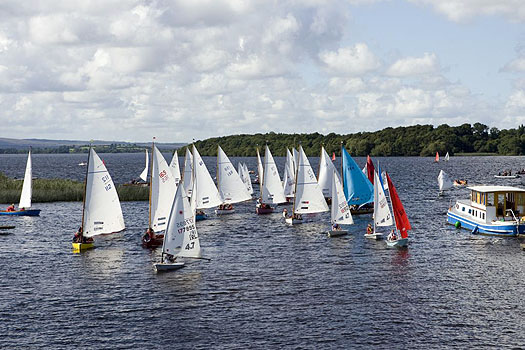
Hyper-crazy kaleidoscope – a variety of boats (with the Shannon One Designs dominant) return to port after racing at Dromineer on Lough Derg
Slipping even further under the radar of public interest are those who don't race but cruise, and those whose enthusiasm is for classic or traditional boats. We saltheads are interested in them and their boats too, but we don't expect the powers that be and the public at large to think of them (if they think of them at all) as anything other than a case of oddity just barely this side of certification.
Thus for the unfortunate folk who end up running the sailing show nationally and internationally, so diverse are the demands of the sailing population that they tend to keep their heads down, and follow the money. They'll know that those in government and disbursing public sports funding will tend to share the interests and attitudes of the general public.
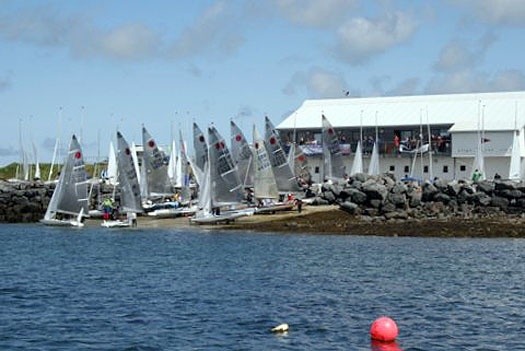
When a World Championship comes to call at one of Ireland's friendly neighbourhood club – Fireballs at Sligo YC at Rosses Point for their Worlds last year Photo: Bryan Armstrong
So as far as Irish sailing national administration is concerned, there's an enormous hunger for international sailing medals, Olympic ones preferred. If we scratched hard enough, we'd probably find that their dearest wish is that there should be a restrospective Olympic Pewter Medal for being fourth – we'd be in line for a few of those, starting with Eric Strain in the Dragon Class way back in 1948.
Sailing in all its glorious variety is one very confused picture, accompanied by a hugely complex narrative. Thus the Olympics are a Godsend for administrators, as they act as a ferociously efficient editing process. The fact that the Laser is the only Olympic class which has anything approaching global popularity is neither here nor there. Once you get into bed with the simplified Olympic machine, that's it – normality is out the window, but at least the picture is more clearcut.
Even if the format of an Olympiad only every four years means that totally-dedicated Olympic atheletes are freaks, it's a freak show which provides sailing with a useful handle for making sense of itself, and communicating with the rest of the world. But when you throw modern celebrity culture into an already toxic mix, with young sailors being led to idolize only the top stars, there's inevitably trouble. Total concentration on what's going on at the top of the pyramid means that the structure is being neglected further down, and there's distress at grass roots.
It's this concern which was aired by Norman Lee of Wicklow and Lough Derg and Bryan Armstrong of Sligo at last weekend's ISA conference, and it will be aired again in what promises to be a robust gathering in the National YC on March 23rd. Bluntly, ordinary club dinghy sailors, the backbone of much of our sport, feel that their interests are being sidelined in pursuit of the top international awards, and they see ordinary club life suffering as the focus is narrowed on the glamour events and categories.
Is what they hope for attainable? Is it really possible to get young people passionately involved in, and committed to, sailing at the local level when all of today's media are bombarding them with images of superstars in glossy boats at glamorous locations?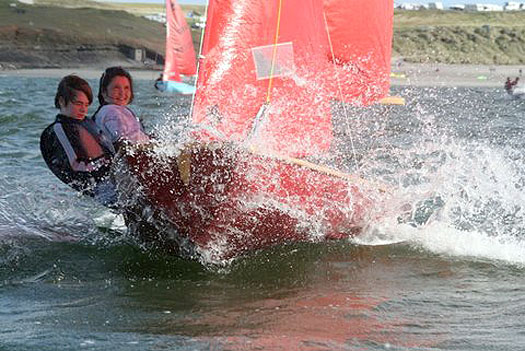
Junior dinghy sailing at its best – Mirror racing at Sligo Photo: Bryan Armstrong
One particular concern is that the sport at club level seems to suffer its greatest loss among those between 16 and 24. But is sailing unique in this? Even in everyday family life, there's a natural estrangement at this age. As Mark Twain sagely remarked: "When I was 15, my father was clearly a complete idiot. But by the time I'd become 25, it was quite extraordinary how much good sense and wisdom the old fellow had since managed to acquire".
Maybe we should accept that we have to lose them for a while, but that if and when they return to sailing, it will be as adults making their own choice, and they'll be much more useful to their club and community as a result. And with any luck they'll have learned that life for 99.99% of us is not all about four year freak shows. Life is about humdrum everyday existence, and finding a certain enjoyment in it. For sure, there'll always be those aspiring for just one single day as an eagle, rather than a hundred years as a sheep. Yet for most of us, we must worship with the God of Small Things. But whether we can expect an allocation of respect, funding and resources for this is the topic for March 23rd.
OCEAN ACHIEVEMENT
The Ocean Cruising Club, international body for those who sail the Seven Seas, has awarded major trophies to Tim Severin (he lives in Courtmacsherry in West Cork these days) and Fergus and Kay Quinlan of Kinvara in County Galway.
The Quinlan achievement, a three year voyage around the world with their own-built steel cutter Pylades, was highlighted here three weeks ago when it took the Faulkner Cup, top trophy of the Irish Cruising Club, for the third year in a row. But recognition by the Ocean Cruising Club is a salute from an organisation which has played the leading role in long distance voyaging since 1954, and it reflects great credit on Pylades and her crew.
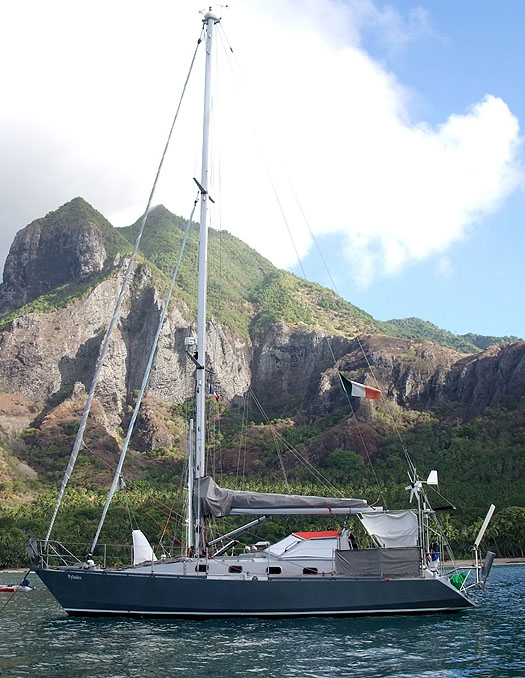
Living the Pacific cruising dream – Pylades at Nuka Hiva in the French Marquesas Photo: Fergus Quinlan
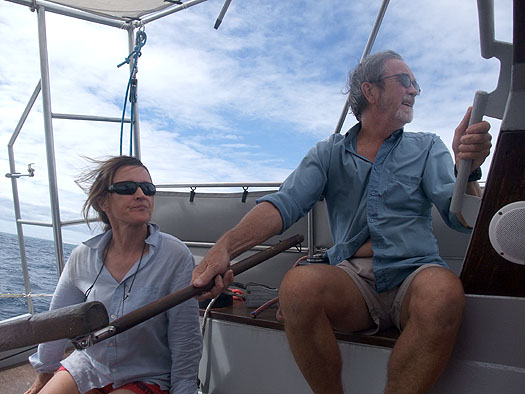
Voyaging couple: Kay and Fergus Quinlan sailing aboard Pylades off Moorea (don't tell anyone, but they were racing at the time)
Tim Severin's renowned re-enactments of ancient voyages in small and primitive craft first gained recognition with his re-creation of the Brendan voyage in a leather boat across the North Atlantic from West Kerry to North America by the northern route. He dramatically demonstrated that the long voyages of the Irish monks, assumed by many to be no more than the stuff of myth and legend, could indeed have been achieved with the boats and technology available at the time of St Brendan.
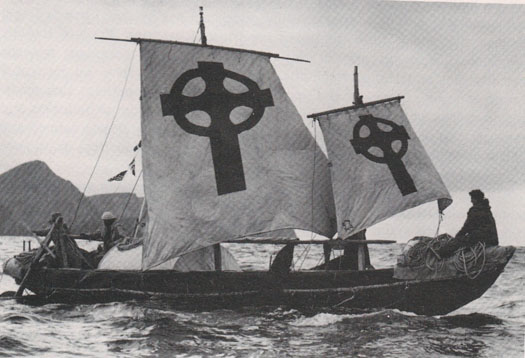
Tim Severin's St Brendan departing West Kerry at the start of the Transatlantic voyage in 1976. The "giant leather currach" was built in Crosshaven Boatyard
The founder of the Ocean Cruising Club, Humphrey Barton, had a long association with Ireland. In 1935 he raced in the Irish Cruising Club's offshore event from Howth to Peel in the Isle of Man. The winner of the stormy race was John B Kearney skippering the 38ft Mavis, which he had designed and built himself in 1923-25. However, because of the establishment of the Irish Free State in 1922 with its relative isolation in global maritime terms, Kearney's skills were virtually unknown outside Dublin. But after seeing how well Mavis raced across the Irish Sea, Barton ensured that the designer and builder from Ringsend became much more widely known, and then after Mavis was the overall winner of the Clyde Cruising Club's popular annual race to Tobermory in 1938, John Kearney's renown was assured.
#annalisemuphy – Like Miami, Florida a month ago Ireland's Annalise Murphy will try out the Rio 2016 racing format at Trofeo Princesa Sofia Mapfre, Spain later this month.
The 44th edition of the Trofeo SAR Princesa Sofia Mapfre for Olympic classes, the first European event of the ISAF Sailing World Cup, has been chosen by ISAF to test the racing format to be used at the Rio 2016 Olympics.
In early February, Annalise had a 'disastrous' conclusion in three short medal races in Florida where the Irish one time leader of the USA Olympic classes regatta went from first to fourth overall, denying her a place on the podium in her first event on the road to Rio 2016. It will be something the Afloat Irish Sailor of the Year 2012 is keen to correct in a fornights time.
The Trofeo Princesa Sofia Mapfre, to be held in the bay of Palma from 30 March to 6 April with the participation of the top world sailors of Olympic and Paralympic classes, will use a new racing format combining innovation and simplicity and aims at having the fairest event possible following the request from ISAF.
Following some tests in SWC Miami, ISAF concluded "there were too many differences in the racing format in each class" a fact that caused important problems to the scoring system so it was decided to unify criteria starting at the Sofia Mapfre.
ISAF also considered some of the rules applied in Miami did not work well and therefore will no longer be used. Among some of the discarded ideas there are "the winner of the last race is the overall winner" – this was tested by the windsurfers- or sailing three medal races for the Laser and Laser Radial.
The approximately 800 sailors that will take part at the Sofia Mapfre, the only Spanish event of the ISAF Sailing World Cup, will sail qualifying and final series – with one discard, like they did last year and at the London 2012 Olympics.
But two main novelties which were successful in Miami will be introduced at the SWC Palma. On one hand, the qualifying series score as one of the final series races, rule already proposed for Rio 2016. On the other hand, two medal races -final races always scoring double points, non-discardable and reserved to the top ten sailors- will be sailed in all classes except for the 49er and 49er FX that will sail four Stadium Races, of ten minutes duration instead of thirty and reserved to the top eight and with single scoring; with four non-discardable races. The results of the now called Final Day will be added to the results of the final series (which already include the qualifying series as one race) to decide the final overall results and podium.
On the other hand, for the monotypes both the qualifying and the final series will consist of six races of 50 minutes duration (in the final series, one of these six races is the one resulting from the qualifying series), while the 49er, 49er FX and Nacra (the new mixed skiff) will sail 30 minute races, nine in the qualifying series and six (plus one carried forward from the preceding round) for the finals.
Another big change is to be seen in the scoring system. Every single win scores 0 points instead of 1, while second classified scores 2, third scores 3 points and so on. This rule makes single wins more important but it has not yet been decided if it will be used in Río 2016.
ISAF will evaluate this racing format at the Trofeo Princesa Sofia Mapfre and with the sailors' feedback it will make the necessary amendments towards the next SWC regatta to be held in Hyères (France).
"The Sofia Mapfre is proud to be the sailors' event and we are pleased ISAF has chosen Palma to test the racing format and that the sailor's opinion will be taken into consideration in order to define the racing format for the next Olympics", stated Ferran Muniesa, the Trofeo Princesa Sofia Mapfre CEO.
O'Leary Takes a Win in Big Breeze at Bacardi Cup
#bacardicup – The Irish team of Peter O’Leary and Rodney Hagebols (bow 73) are eighth overall after four races at the 86th Bacardi Cup after winning the fourth race in a day of high drama on Biscayne Bay yesterday.
As temperatures hit the high 70s on the third day of racing, the fourth race of the series got underway in 15 knots of breeze, and, with the black flag rule in effect, six boats were disqualified. Wind gusts over 25 knots contributed to 11 boats not finishing the day's single race, including two with broken masts.
Lars Grael and Mario Lagoa (BRA) finished third in the race allowing them to increase the point spread while continuing their hold on first place in the overall standings with 17 points. The Italian team of Diego Negri and Frithjof Kleen finished second in the race and are just nine points out of first. They are followed in the overall standings by 2003 Rolex Yachtsman of the Year Augie Diaz (Miami, Fla.) and Arnis Baltins, who added a 22 to their previous finishes of 3-1-10 for 36 points. Alessandro Pascolato and Henry Boening (BRA) are fourth overall with finishes of 18-8-6-8 for 40 points, and the Canadian team of Brian Cramer and Cam Lymburner round out the top five with 9-7-18-7 for 41 points.
The Italian team of Diego Negri and Frithjof Kleen (bow 52) and Florida's 2012 Olympians Mark Mendelblatt and Brian Fatih (bow 19)
"I have not been racing since last April and needed to dust off the first two days and find the confidence that is needed to race in this highly competitive regatta," said Diego Negri. "Our results are on the rise and I think we're doing a fine job and having fun at the same time. This is my third Bacardi Cup and I'm enjoying it very much. Lars is a very tough competitor. He is one of the best in the world and has shown he is able to race well in both light and stronger wind conditions. I'm looking forward to keep having fun and post good results. If the wind will be as today, I think we might have a chance to win the Cup. It would be a significant achievement."
Although Irish Olympian Peter O'Leary and Rodney Hagebols won today's race, they still carry 36 points earned in race two of the series (once five races have been completed, the scores will reflect each yacht discarding her worst race). With 50 points, they currently stand eighth overall, seven points behind defending champions Xavier Rohart and Pierre Alexis Ponsot (FRA).
"Windy for sure today, 20 plus average," said O'Leary. "Once we got going it was a proper Bacardi Cup regatta in which we stretched legs and hiked hard. The main challenge of the day was to stay in pressure and take advantage of the big breeze. We rounded the last mark in third and were able to beat the Italians on the line. Tomorrow is a lay day and then three more races to go. If we keep posting single digit results we have a chance. We had a bad day yesterday and it was nice to bounce back. Lars is showing to be consistent and is sailing smart... he is the one to beat."
Racing for the Star class resumes on Friday, March 9, after a planned lay day tomorrow. On Thursday, March 7, sailors in the Audi Melges 20, Melges 24 and Viper 640 classes, along with the J/70 class which makes its event debut, will get their first taste of competition on Biscayne Bay. Racing, for all classes, will conclude on Saturday, March 9.
During the event sailors will enjoy the hospitality lounge, BACARDI Rum tastings, as well as the daily prize giving for the top-three finishers and the final awards dinner. A special exhibit of America's Cup history and memorabilia will feature the work of Rhode Island-based photographer Cory Silken in the North Hall of the Coconut Grove Convention Center. The exhibits will be open to the public from noon to 7:00PM daily and are free of charge. The prestigious Coral Reef Yacht Club will coordinate on-water activities in collaboration with Biscayne Bay Yacht Club and Coconut Grove Sailing Club. The U.S. Sailing Center and Shake-A-Leg Miami will also support the event. Racing will be held on three separate courses approximately two miles out on Biscayne Bay.
More information on the BACARDI Miami Sailing Week and the 86th BACARDI Cup is available at www.MiamiSailingWeek.com and www.BacardiCup.com.
Lets Use this Favourable Win to Irish Sailing's Advantage
#irishsailing – The winds of change are never constant and sailors are trained to expect the unexpected. It's an unpredictable sport that makes any sailor cautious about forecasting future performances.
It didn't stop the Irish Sailing Association (ISA) predicting its team would win a medal in Weymouth.
Such was the expectation that nearly anything the 2012 Olympic sailing team did other than stand on the podium would have been a disappointment.
Except that, just like the winds in Weymouth, something unexpected happened when Irish debutante Annalise Murphy led her fleet for most of the event, winning the opening four races with gusto.
It was a most welcome lift that, in the weeks following the regatta, has had many positive spin-offs for Irish sailing.
That Murphy began her campaign for Rio before even coming ashore after the disappointment of the medal race said something about the depth of her ambition. In so doing, she turned around the cruelest result of fourth into an opportunity for the future, albeit four years away.
This week she was awarded the Irish Times Sportswoman of the month for July, the latest in a line of accolades for the Rathfarnham girl.
As Murphy navigated her way through ten days of the hottest competition in her life, leading the regatta for most of it, her appeal reached beyond the traditional sailing community.
"When I saw the tricolour leading the fleet, it was like Packie Bonner's save," tweeted one of her many twitter followers. "It's Katie Taylor on water," tweeted another.
"I hope more people can understand sailing now," the 22-year-old said at a homecoming event at the National Yacht Club on Monday.
The challenge for sailing now is to capitalise on Annalise's appeal. It could not come at a better time because the domestic sport is facing 'Olympic' challenges of its own.
Because, although Ireland has posted its best Olympic result in 32 years, coming just weeks after a silver medal performance at the Youth Worlds, the domestic sport is in choppy waters.
Sailing cannot grow simply by looking towards the next Olympics as this serves only to increase the pressure on the sport's small group of high-performance athletes.
Instead, it's a question of providing more choice to grow the numbers going afloat.
Sailing is unique because it offers a strong non-competitive aspect. It's a hobby or pastime which can be enjoyed by young and old, and also by families.
If sailing can increase its numbers in these categories, then it will increase its talent pool. This, in turn, means that emerging talent which wishes to pursue the Olympic path can do so.
Today the dominant culture in sailing in Ireland is a racing one but by continuing on this tack we could be missing out on up to 80% of potential participants, says Alistair Rumball, a racing sailor, but also the proprietor of the country's biggest sailing school where recreational boating has the biggest appeal.
On Wednesday the Taoiseach Enda Kenny welcomed home the Olympic team and he made the point that future sports funding would be have a schools focus so it is important sailing gets a place on the curriculum.
Yacht clubs are struggling under the burden of a shrinking racing membership. Regatta fleets are dwindling. Just 111 boats turned up for Cork Week when there were over 500 just ten years years ago.
Some of the biggest clubs - Howth, the Royal St. George and Royal Cork to name just three - are facing tough times.
In a recession there is inevitable fallout from any sport but it's acute for sailing.
The ISA takes subscriptions from 73 sailing and powerboat clubs in the country, ranging in size from the smallest clubs with only a dozen members to the largest, the Royal St. George Yacht Club in Dun Laoghaire with 1,858 members.
The total number of club members affiliated to the ISA is estimated at over 21,000. In 2010, income from club member subscriptions generated €320,843 for the ISA but in 2011 this had dropped to €286,087. A further drop might be expected this year.
There are other storm clouds on the horizon too with Minister for Sport Leo Varadkar signalling a tightening of the purse strings. This week Galway announced it was not applying for a return visit of the Volvo Ocean Race.
"Currently the sport tries to turn everyone into formula one drivers when most of us are only Sunday motorists," says sailmaker Des McWilliam, a respected sailing industry voice. "The bulk of us only want to drive to the beach not round the world," says McWilliam who believes there is a massive need to embrace a new kind of recreational sailing initiative.
Murphy has captured the public imagination but there is only so much that can be expected from a young star aiming for Rio. The challenge is to broaden the appeal of the sport and so underpin its future.
A high level forum comprising of clubs, classes and sailing schools and other interested parties could develop a national sailing strategy.
Thanks to Annalise Murphy, there's a favourable wind blowing again for Irish sailing. If sailing can adopt her fighting spirit, then the sport could find itself back on the right tack.
Is Irish Sailing Too Focused on the Olympics?
#olympicsailing – Last week, just as Ger Owens announced his intention to campaign a 470 for a possible third Olympic regatta the Irish Sailing Association (ISA) made a written proposal to get rid of that dinghy from the Olympic line up.
The Olympic classes are in a state of flux since the International Sailing Federation (ISAF) signalled its intent to ditch the Star keelboat for the 2016 regatta.
There is a fear too that the sport itself might be cut from the Olympic Games as pressure mounts to cut costs and athletes. It's a situation causing some countries to examine their own Olympic involvements.
There is no doubting the Olympic circuit remains the pinnacle of the sport but there's little doubt either of the appeal of new alternatives being dished up.
ISAF's own sailing world championships is gaining momentum as 'The' event to win.
From the small pool of pro-crews available in this country it's noteworthy that Ireland's Damian Foxall and Justin Slattery, found success entirely outside of the Olympic environment.
Last year, at international cruiser level, the Irish Cruiser Racing Association (ICRA) brought home the Commodores Cup.
Sailing has historically had good links into the International Olympic Council (IOC), and will be making its 26th appearance in the Olympic Programme in 2012. Sailing scores well against some of the criteria to be kept as an Olympic sport, but is currently weak in other important areas such as spectator and broadcast revenue, and costs.
It has a strong European following but participation is low in Africa and Asia.
Still, 54 countries have been exercised enough to make submissions to ISAF on the 2016 Olympic sailing competition.
The loss of the Star keelboat would be a near fatal blow to Ireland's main hopes with the Peter O'Leary and David Burrows partnership seen as medal hopes next year and in 2016 too.
In its written submission the Irish authority said the mens keelboat should stay but it has also opted to keep five classes where there is no Irish sailing development. However, this is partly because the rules do not allow for partial submissions, but require a full slate of 10 classes.
Ireland has never had a sailboard, never had a Tornado catamaran and never had a women's keelboat. We have not mustered a women's 470 team since Atlanta so it is unclear where an Irish women's skiff that the ISA has proposed is going to come from.
The ISA have proposed the following slate: Men's Board or Kite Board- Evaluation; Women's Board or Kite Board- Evaluation ; Men's 1 Person Dinghy – Laser ; Women's 1 Person Dinghy – Laser Radial Men's 2nd 1 Person Dinghy – Finn ; Men's Skiff- 49er ; Women's Skiff- Evaluation Men's Multihull- Tornado ; Men's Keelboat- Evaluation ; Women's Keelboat- Elliot 6m.
The reality is that domestic sailing is so far removed from these classes that some now question the pursuit of the Olympic dream at all but that's a decision that would have a major impact on government funding which heavily supports Olympic involvement.
It's too narrow to measure medals through grants alone and any withdrawal would have other consequences too.
Olympic involvement begets better standards nationally, as there is trickle back of knowledge through coaching.
The Sports Council high performance grant given to the ISA is ring fenced for Olympic sailing and its high performance programme ands runs to 400k per annum.
It's good state money that is bearing fruit at junior and youth level. Finn Lynch was second in the Topper World championships last year. Philip Doran won an under 17 Laser Radial World Championship. In the same class Olympic campaigner Annalise Murphy has also won a world under 21–title and recent performances at senior level, including a fourth in Miami in January are very encouraging.
Ireland has participated at every Games since London 1948 except Mexico in 1968. Malahide's David Wilkins and Jamie Wilkinson won Olympic silver in 1980 but since then a top eight Olympic finish in any class has eluded us.
Ireland is not alone in suggesting changes that defy historical results to the Olympic regatta, in Britain the Royal Yachting Association is proposing to ditch the Star too, a class where they have won Gold twice, and silver once in the last six games and which provides a progression path for their very successful Laser and Finn programmes.
Olympic success is counted only in medals but the sailing here has been thriving without it.
Internationally there are now other opportunities, some with more appeal. The Volvo Ocean Race (with Irish government involvement running to Euro 4 Million), the America's Cup and the World Match Racing tour now provide professional outlets for a handful of Irish sailors who might previously have only been found on the Olympic circuit.
What's important for a small sailing nation with limited resources is a plan that can bring home results, even if this means moving outside the Olympic circle.
#bacardicup –Royal Cork's Peter O'Leary is off to a flying start at the 2013 Bacardi Cup in Miami taking second in unseasonally chilly conditions and light and shifty winds on Biscayne bay.
O'Leary, who crossed the finish line in second with crew Rodney Hagebols (AUS) to Brazil's Lars Grael said after racing. "Second in today's conditions is not bad at all. We had a good start but after the first mark we never thought we could catch Lars. We will try to keep going strong and get single digit results and we might have a chance to finish first."
For most residents of the Northern Hemisphere, 63 degrees and sunshine would be a welcome change after months of cold, wintry weather. However, for the 56 Star teams that headed out on Biscayne Bay for the 86th BACARDI Cup, the light air that accompanied the chillier than usual temperatures allowed only one of two planned races to be held on the first day of competition. Anxious to get racing, the talent heavy fleet pushed the line which resulted in seven teams collecting OCS points as the headline event of the fourth annual BACARDI Miami Sailing Week (BMSW) presented by EFG Bank got underway in six knots of breeze.
"Today's conditions were very tough, difficult to predict due to light wind and very shifty," said Lars Grael, Brazil's two-time ('88, '96) Tornado Olympic Medalist, after he and crew Mario Logos won the day's lone race. "The RC did its best to get a good start. We were able to round the first mark in first and then able to get a good lead at the end of the downwind leg. The RC shortened the course and we managed to keep the lead until the end. Good competition out there against the Irish [skipper Peter O'Leary] and Augie Diaz (Miami, Fla.). Overall, [it was] a difficult day as it was very hard to predict the wind."
Local Miami sailing star Augie Diaz, the 2003 Rolex Yachtsman of the Year, was happy with the third-place finish he earned with crew Arnis Baltins. "A top-10 is hard to get at the Bacardi Cup! Except for Lars, who was leading with a good margin, everyone else in the top 10 was racing competitively. Too early to say who will win the Cup, but Lars and Peter will be tough to beat. It's no accident they are first and second today, I think they are the favorites."
Opening BACARDI Miami Sailing Week was the inaugural PRO-Am Charity Regatta which featured Diaz and Grael, along with defending Bacardi Cup Champion Xavier Rohart, 2009 Star World Champion George Szabo (San Diego, Calif.) and Melges 32 National Champion Jeff Ecklund at the helm of five Sonars on loan from Team Paradise. Sixteen people made donations to be aboard as crew for the day, with Sailing Heals, Shake-A-Leg Miami and Team Paradise coming out the winners as proceeds from the event went to benefit those organizations.
More information on www.MiamiSailingWeek.com and www.BacardiCup.com



























